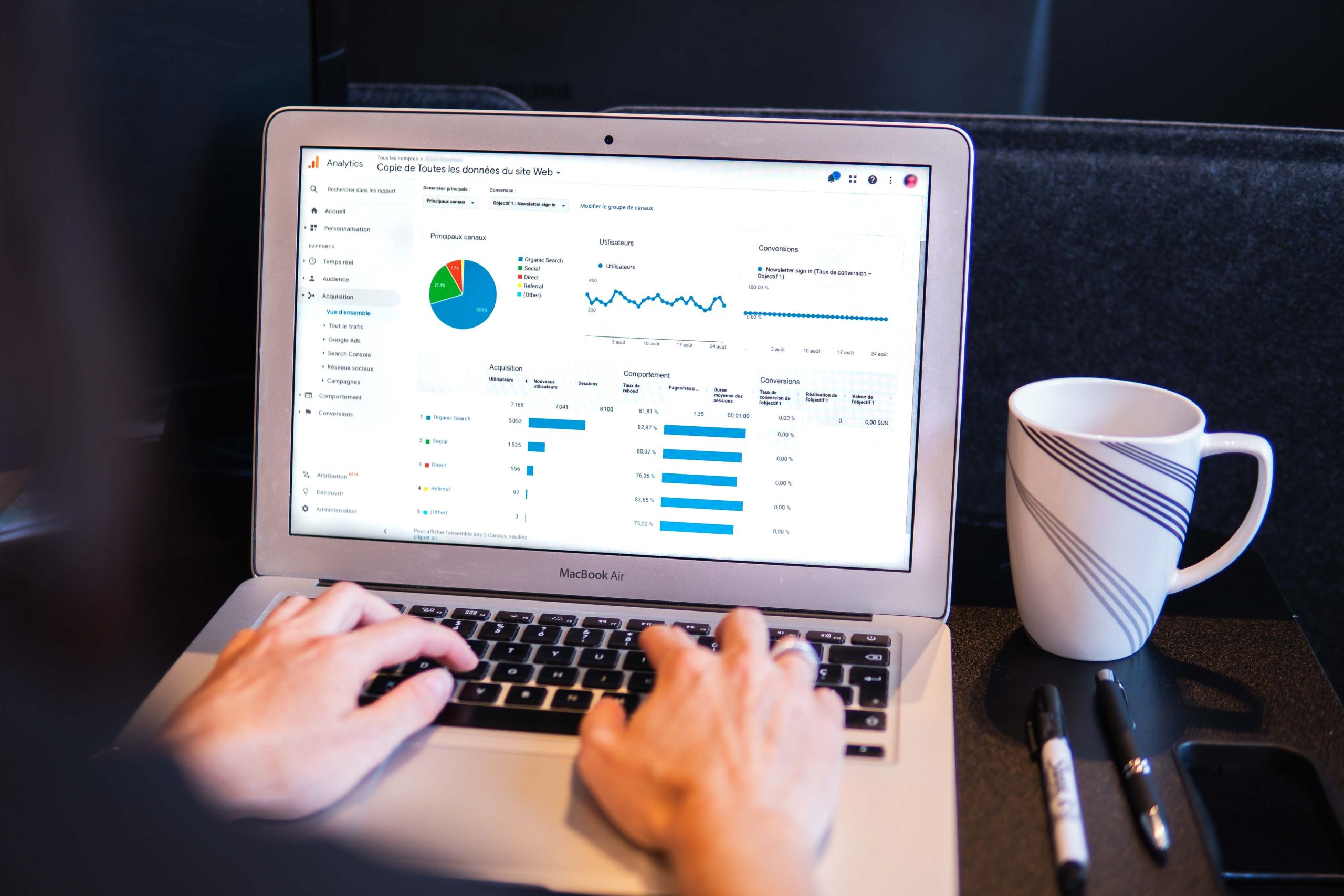5 min read
March 13, 2023
Industry Analysis: A Data Analytics Guide to Industry-Specific Analysis
Introduction
Are you interested in pursuing a career in industry analysis? If so, it’s essential to have a solid understanding of the fundamentals and best practices in this field. Industry analysis involves evaluating the current and future state of an industry to identify opportunities and challenges. It’s a crucial component of strategic planning and decision-making for businesses across various sectors.
-> Click here to enroll in our Data Analytics Bootcamp
In this data analytics guide, we’ll provide an overview of industry analysis and explain why it’s an essential skill for professionals in this field. We’ll explore the Five Forces framework and how it’s used to analyze industries. Additionally, we’ll delve into industry-specific analyses for popular sectors such as healthcare, finance, and technology, and provide examples of how data analytics can be applied in each context.
Whether you’re looking to enter the industry analysis field or seeking to refresh your knowledge, this guide will equip you with the foundational knowledge and practical tools needed to succeed. We’ll also introduce Amphy’s online courses on data analytics and how they can help you develop the skills necessary for a successful career in industry analysis.
Table of Contents:
What is Industry Analysis and Why is it Important?
Industry analysis is a process that involves examining the current and future state of an industry, including market trends, competitors, and other factors that may impact the industry’s growth and profitability. The goal of industry analysis is to identify opportunities and risks, which can inform strategic decision-making for businesses and investors.
Industry analysis is important for several reasons. First, it can help businesses make informed decisions about entering or exiting an industry, expanding into new markets, or developing new products or services. Second, industry analysis can help investors evaluate the potential return on investment and risks associated with investing in a particular industry or company. Finally, industry analysis can provide insights into the broader economic and social trends that may impact a specific industry, such as changing consumer preferences or technological advancements.
By conducting a thorough industry analysis, businesses and investors can gain a competitive advantage by staying ahead of market trends, identifying new opportunities, and avoiding potential risks. In the next section, we’ll explore the key components of industry analysis.
It's a crucial component of strategic planning and decision-making for businesses across various sectors.
What is Included in an Industry Analysis?
Industry analysis involves several key components, including market size and trends, competition, customer analysis, and regulatory factors. Let’s explore each of these components in more detail:
Market Size and Trends:
Market size refers to the total revenue generated by an industry, while market trends refer to changes in the industry’s growth, demand, and consumer behavior. Analyzing market size and trends can help businesses and investors identify new growth opportunities and forecast future demand for products or services.
Competition:
Competitor analysis involves examining the strengths and weaknesses of competitors, as well as their market share, pricing strategies, and product offerings. Understanding the competitive landscape can help businesses and investors identify areas where they can differentiate themselves and gain a competitive advantage.
Customer Analysis:
Customer analysis involves understanding the needs, preferences, and behaviors of customers within the industry. This includes analyzing consumer demographics, purchasing behavior, and satisfaction levels. Customer analysis can help businesses and investors identify new customer segments and develop targeted marketing strategies.
Regulatory Factors:
Regulatory factors refer to the laws and regulations that govern the industry, including environmental regulations, labor laws, and industry-specific regulations. Understanding these factors can help businesses and investors navigate legal and regulatory challenges and identify potential compliance issues.
By analyzing each of these components, businesses and investors can gain a comprehensive understanding of the industry and make informed decisions about strategic direction, investment opportunities, and risk management. In the next section, we’ll explore how to write an industry analysis report.

How Do You Write an Industry Analysis?
Writing an industry analysis report can seem daunting, but it’s a critical skill for businesses and investors alike. Here are the key steps to follow when writing an industry analysis report:
Step 1: Define Your Scope
Before diving into your analysis, it’s important to define the scope of your report. This includes the industry or industries you will be analyzing, the time period you will be covering, and the specific components of the industry you will be examining.
Step 2: Gather Data
Once you’ve defined your scope, you’ll need to gather data on the industry. This includes both primary and secondary research, such as industry reports, news articles, and interviews with industry experts.
Step 3: Analyze the Data
Once you have gathered your data, it’s time to analyze it. This involves looking for patterns, trends, and insights that can help you understand the industry and identify opportunities and threats.
Step 4: Identify Key Findings
Based on your analysis, identify the key findings of your report. This may include market size and growth trends, competitive landscape, customer analysis, and regulatory factors.
Step 5: Draw Conclusions and Make Recommendations
Finally, draw conclusions and make recommendations based on your findings. This may include identifying areas for growth or potential risks, as well as making recommendations for strategic direction, investment opportunities, and risk management.
By following these steps, you can create a comprehensive and informative industry analysis report that provides valuable insights for businesses and investors. In the next section, we’ll explore the Five Forces Framework, a tool commonly used in industry analysis.

What are the five forces of industry analysis?
To conduct a comprehensive industry analysis, it is essential to consider the five forces that shape industry competition. These forces, identified by Michael Porter, include the threat of new entrants, bargaining power of suppliers, bargaining power of buyers, threat of substitute products or services, and intensity of competitive rivalry.
Threat of New Entrants:
This force refers to the likelihood of new competitors entering the industry. Factors that can influence this force include ease of entry, capital requirements, and government regulations.
Bargaining Power of Suppliers:
This force refers to the power of suppliers to influence the price and quality of inputs. Factors that can influence this force include the concentration of suppliers, availability of substitute inputs, and switching costs.
Bargaining Power of Buyers:
This force refers to the power of buyers to influence the price and quality of outputs. Factors that can influence this force include the concentration of buyers, the availability of substitute products or services, and the importance of the industry’s outputs to the buyer.
Threat of Substitute Products or Services:
This force refers to the likelihood of customers switching to substitute products or services. Factors that can influence this force include the availability of substitutes, the price and quality of substitutes, and switching costs.
Intensity of Competitive Rivalry:
This force refers to the level of competition among existing competitors in the industry. Factors that can influence this force include the number of competitors, industry growth rate, and the level of product differentiation.
Understanding these five forces can help you identify the key drivers of competition in an industry, assess the attractiveness of the industry, and develop strategies to compete effectively within it.
Industry-Specific Analytics: Applications and Examples
Industry-specific analyses are critical for understanding the unique characteristics, trends, and opportunities within each industry. Data analytics can be applied to industry-specific analyses to provide valuable insights and inform strategic decision-making. In this section, we will provide a brief overview of several industries and highlight some of the ways in which data analytics can be applied.
Retail Industry Analysis:
The retail industry is a highly competitive and dynamic industry with constantly changing consumer preferences and behaviors. Data analytics can be used to track sales trends, forecast demand, optimize inventory, and personalize marketing campaigns to individual consumers.
Healthcare Industry Analysis:
The healthcare industry is one of the largest and fastest-growing industries globally. Data analytics can be used to improve patient outcomes, reduce costs, and streamline operations. Applications of data analytics in healthcare include disease surveillance, predictive modeling, and clinical decision support.
Financial Services Industry Analysis:
The financial services industry is a complex and heavily regulated industry with a high degree of risk. Data analytics can be used to monitor risk, detect fraud, and optimize investment strategies. Applications of data analytics in financial services include credit risk modeling, anti-money laundering, and fraud detection.
Manufacturing Industry Analysis:
The manufacturing industry is undergoing significant disruption due to advances in technology and globalization. Data analytics can be used to improve production efficiency, reduce costs, and enhance quality control. Applications of data analytics in manufacturing include predictive maintenance, supply chain optimization, and quality control.
Human Resources Industry Analysis:
The human resources industry is critical for recruiting, training, and retaining talent. Data analytics can be used to identify high-performing employees, optimize compensation, and improve employee engagement. Applications of data analytics in human resources include workforce planning, talent acquisition, and employee performance evaluation.
Transportation and Logistics Industry Analysis:
The transportation and logistics industry is essential for the movement of goods and people. Data analytics can be used to optimize route planning, reduce fuel consumption, and improve delivery times. Applications of data analytics in transportation and logistics include route optimization, predictive maintenance, and demand forecasting.
Energy Industry Analysis:
The energy industry is undergoing a significant transformation due to advances in renewable energy sources and environmental concerns. Data analytics can be used to optimize energy production, reduce costs, and improve environmental sustainability. Applications of data analytics in the energy industry include demand response, predictive maintenance, and energy trading.
Agriculture Industry Analysis:
The agriculture industry is essential for feeding the world’s population. Data analytics can be used to optimize crop yields, reduce waste, and improve sustainability. Applications of data analytics in the agriculture industry include precision farming, crop monitoring, and weather forecasting.
Education Industry Analysis:
The education industry is undergoing significant transformation due to advances in technology and changing student demographics. Data analytics can be used to improve student outcomes, reduce costs, and enhance curriculum design. Applications of data analytics in the education industry include student performance evaluation, personalized learning, and predictive modeling.
Real Estate Industry Analysis:
The real estate industry is a critical driver of economic growth and development. Data analytics can be used to identify trends, forecast demand, and optimize real estate investments. Applications of data analytics in the real estate industry include property valuation, market analysis, and risk assessment.

Online Data Analytics Courses with Amphy
In today’s fast-paced business environment, keeping up with the latest data analytics techniques and tools is essential for professionals in the field. Continuous learning and professional development are crucial to staying competitive and advancing one’s career.
Fortunately, there are many online courses available that can help individuals improve their data analytics skills. One such platform is Amphy, which offers a range of courses on data analytics for beginners and experienced professionals alike.
Amphy’s courses cover topics such as data visualization, statistical analysis, machine learning, and more. They are taught by experienced instructors who provide hands-on, practical training that can be immediately applied to real-world business problems.
Whether you are just starting out in the field of data analytics or are looking to enhance your existing skills, Amphy’s courses can help you achieve your goals. With the convenience of online learning, you can fit these courses into your busy schedule and learn at your own pace. So why wait? Sign up for an Amphy course today and take the first step towards advancing your career in data analytics!
Conclusion
In conclusion, industry analysis is a critical component in business strategy and decision-making. Understanding industry trends, market competition, and customer behavior is essential in identifying opportunities and mitigating risks. Data analytics plays a vital role in providing valuable insights and making informed decisions based on data-driven evidence.
As industries continue to evolve and become more complex, professionals need to keep up with the latest trends and technologies. Continuous learning and professional development are essential to advance one’s career in the field of data analytics. Online courses, such as those offered by Amphy, provide a flexible and accessible way to gain new skills and knowledge.
Whether you’re just starting or are already working in the field of data analytics, conducting industry analyses is a crucial skill to have. By following the steps outlined in this guide, you can learn how to conduct an effective industry analysis that can help you make informed decisions and drive success for your organization.
Remember, industry analysis is not a one-time activity but an ongoing process that requires constant monitoring and evaluation. By keeping up-to-date with industry trends and leveraging data analytics, you can stay ahead of the competition and achieve your business goals.
Related Content:
Meet Amphy
The largest marketplace for live
classes, connecting and enriching
humanity through knowledge.
Related Articles